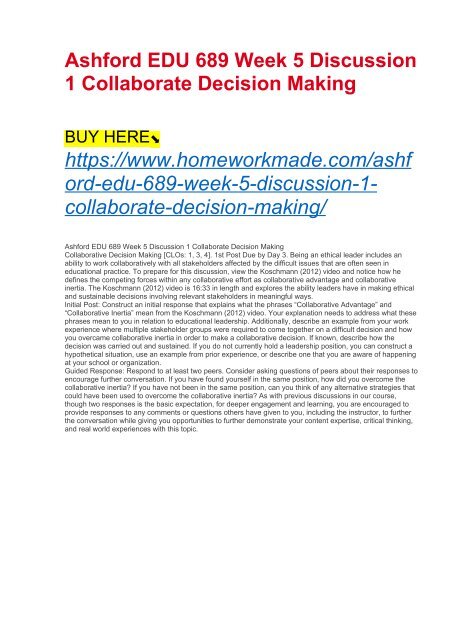You also want an ePaper? Increase the reach of your titles
YUMPU automatically turns print PDFs into web optimized ePapers that Google loves.
<strong>Ashford</strong> <strong>EDU</strong> <strong>689</strong> <strong>Week</strong> 5 <strong>Discussion</strong><br />
1 <strong>Collaborate</strong> <strong>Decision</strong> <strong>Making</strong><br />
BUY HERE⬊<br />
https://www.homeworkmade.com/ashf<br />
ord-edu-<strong>689</strong>-week-5-discussion-1-<br />
collaborate-decision-making/<br />
<strong>Ashford</strong> <strong>EDU</strong> <strong>689</strong> <strong>Week</strong> 5 <strong>Discussion</strong> 1 <strong>Collaborate</strong> <strong>Decision</strong> <strong>Making</strong><br />
Collaborative <strong>Decision</strong> <strong>Making</strong> [CLOs: 1, 3, 4]. 1st Post Due by Day 3. Being an ethical leader includes an<br />
ability to work collaboratively with all stakeholders affected by the difficult issues that are often seen in<br />
educational practice. To prepare for this discussion, view the Koschmann (2012) video and notice how he<br />
defines the competing forces within any collaborative effort as collaborative advantage and collaborative<br />
inertia. The Koschmann (2012) video is 16:33 in length and explores the ability leaders have in making ethical<br />
and sustainable decisions involving relevant stakeholders in meaningful ways.<br />
Initial Post: Construct an initial response that explains what the phrases “Collaborative Advantage” and<br />
“Collaborative Inertia” mean from the Koschmann (2012) video. Your explanation needs to address what these<br />
phrases mean to you in relation to educational leadership. Additionally, describe an example from your work<br />
experience where multiple stakeholder groups were required to come together on a difficult decision and how<br />
you overcame collaborative inertia in order to make a collaborative decision. If known, describe how the<br />
decision was carried out and sustained. If you do not currently hold a leadership position, you can construct a<br />
hypothetical situation, use an example from prior experience, or describe one that you are aware of happening<br />
at your school or organization.<br />
Guided Response: Respond to at least two peers. Consider asking questions of peers about their responses to<br />
encourage further conversation. If you have found yourself in the same position, how did you overcome the<br />
collaborative inertia? If you have not been in the same position, can you think of any alternative strategies that<br />
could have been used to overcome the collaborative inertia? As with previous discussions in our course,<br />
though two responses is the basic expectation, for deeper engagement and learning, you are encouraged to<br />
provide responses to any comments or questions others have given to you, including the instructor, to further<br />
the conversation while giving you opportunities to further demonstrate your content expertise, critical thinking,<br />
and real world experiences with this topic.

















